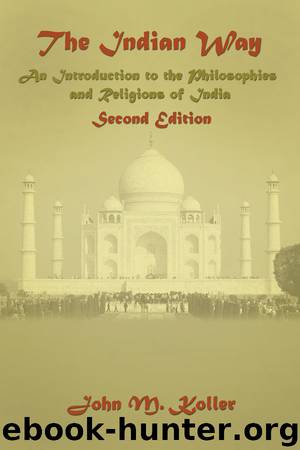The Indian Way: An Introduction to the Philosophies & Religions of India by John M Koller

Author:John M Koller [Koller, John M]
Language: eng
Format: epub
ISBN: 9781315507392
Publisher: Taylor and Francis
Published: 2016-05-22T22:00:00+00:00
Here we encounter, for the first time in Indian thought, a clearly stated concept of avatārana, the crossing over of the supreme spirit of the universe into this material world. God’s descent into the world in human form is an extremely effective way of bridging the gap between God and humans, a truth recognized by Christians as well as by Hindus. Jesus, the adorable little baby; Jesus, the wise teacher who loved and cared for sinners and the poor; Jesus, the man who so loved us that he gave up his own life—who cannot relate to God when He appears in these forms? In a similar way, Hindus, while acknowledging that Brahman, the ground of all existence and our innermost Self, is completely unmanifest, beyond all possible characterization, realize the human need for a Supreme Reality to which they can relate personally. Recognizing the unlimited power of the Ultimate Reality to take on an infinite variety of forms, it seems entirely appropriate to them that the Supreme Spirit should take on forms that will inspire human beings and allow them to experience their own inner divinity through personal relationships with God. Thus, they readily acknowledge the actuality of God’s incarnation—not just once, but many times. And not just in human form, but in a great variety of forms.
According to Hindu tradition the incarnations of Vishnu, who as Supreme Lord and Sustainer of the universe, symbolizes the ultimate Brahman, include Matsya, half man, half fish; Kūrma, a tortoise with human trunk and head; Varāha, the boar; Naraśiṁha, half man, half lion; Vāmana, the dwarf who swells to the size of a giant; Paraśurāma, the fierce mustached brāhmaṇa who put the kṣatriyas in their proper place of subordination to the brāhmaṇas; Rāma, the beloved hero of the Rāmāyana; Krishna of the Gītā; the Buddha; and Kalkin, rider of the white horse who will appear at the end of the present heavy age of the Kālī yuga. In addition, his power is present in Rādhā, divine lover of Krishna, and in the Goddesses Shrī (Lakshmī) and Bhū, his divine consorts. The idea of many forms and incarnations of Vishnu is celebrated in the litany of his names. According to tradition, Vishnu has 1,008 names, a number suggesting the infinity of forms that the Supreme Spirit of the universe assumes.
In the Gītā, however, we hear neither of these other incarnations of Vishnu nor of Krishna the playful child, always up to mischief and playing pranks on everyone. Arjuna is a warrior on a battlefield making it appropriate that the Lord appear to him in the guise of Krishna, his chariot driver. Having confided his confusion and despondency to his driver, and realizing that Krishna is none other than the Lord Himself, Arjuna requests a vision that will guide him in doing the right thing.
My very being is afflicted and weakened by compassion;
My mind is confused about my duty.
I ask Thee, which is better? Tell me definitely.
I am your pupil; teach me who comes to Thee.
Download
This site does not store any files on its server. We only index and link to content provided by other sites. Please contact the content providers to delete copyright contents if any and email us, we'll remove relevant links or contents immediately.
| Anthropology | Archaeology |
| Philosophy | Politics & Government |
| Social Sciences | Sociology |
| Women's Studies |
The remains of the day by Kazuo Ishiguro(8961)
Tools of Titans by Timothy Ferriss(8357)
Giovanni's Room by James Baldwin(7313)
The Black Swan by Nassim Nicholas Taleb(7097)
Inner Engineering: A Yogi's Guide to Joy by Sadhguru(6780)
The Way of Zen by Alan W. Watts(6589)
Asking the Right Questions: A Guide to Critical Thinking by M. Neil Browne & Stuart M. Keeley(5747)
The Power of Now: A Guide to Spiritual Enlightenment by Eckhart Tolle(5740)
The Six Wives Of Henry VIII (WOMEN IN HISTORY) by Fraser Antonia(5493)
Astrophysics for People in a Hurry by Neil DeGrasse Tyson(5172)
Housekeeping by Marilynne Robinson(4432)
12 Rules for Life by Jordan B. Peterson(4298)
Double Down (Diary of a Wimpy Kid Book 11) by Jeff Kinney(4257)
The Ethical Slut by Janet W. Hardy(4235)
Skin in the Game by Nassim Nicholas Taleb(4231)
Ikigai by Héctor García & Francesc Miralles(4228)
The Art of Happiness by The Dalai Lama(4118)
Skin in the Game: Hidden Asymmetries in Daily Life by Nassim Nicholas Taleb(3985)
Walking by Henry David Thoreau(3948)
